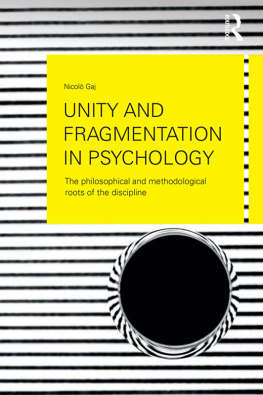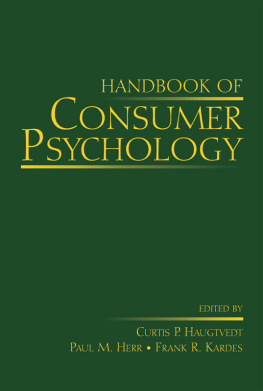Palgrave Studies in the Theory and History of Psychology
Series Editors
Jack Martin
Department of Psychology, Simon Fraser University, Burnaby, BC, Canada
Thomas Teo
Department of Psychology, York University, Toronto, ON, Canada
Palgrave Studies in the Theory and History of Psychology publishes scholarly books that use historical and theoretical methods to critically examine the historical development and contemporary status of psychological concepts, methods, research, theories, and interventions. The books in the series are characterised by an emphasis on the concrete particulars of psychologists scientific and professional practices, together with a critical examination of the assumptions that attend their use. These examinations are anchored in clear, accessible descriptions of what psychologists do and believe about their activities. All the books in the series share the general goal of advancing the scientific and professional practices of psychology and psychologists, even as they offer probing and detailed questioning and critical reconstructions of these practices.
Series Editorial Board:
Alex Gillespie, London School of Economics and Political Science, UK
Suzanne R. Kirschner, College of the Holy Cross, USA
Annette Mlberger, Universitat Autonoma de Barcelona, Spain
Lisa Osbeck, University of West Georgia, USA
Peter Raggatt, James Cook University, Australia
Alexandra Rutherford, York University, Canada
More information about this series at http://www.palgrave.com/gp/series/14576
Re-envisioning Theoretical Psychology
Diverging Ideas and Practices
Editor
Thomas Teo
Department of Psychology, York University, Toronto, ON, Canada
Palgrave Studies in the Theory and History of Psychology
ISBN 978-3-030-16761-5 e-ISBN 978-3-030-16762-2
https://doi.org/10.1007/978-3-030-16762-2
The Editor(s) (if applicable) and The Author(s), under exclusive license to Springer Nature Switzerland AG 2019
This work is subject to copyright. All rights are solely and exclusively licensed by the Publisher, whether the whole or part of the material is concerned, specifically the rights of translation, reprinting, reuse of illustrations, recitation, broadcasting, reproduction on microfilms or in any other physical way, and transmission or information storage and retrieval, electronic adaptation, computer software, or by similar or dissimilar methodology now known or hereafter developed.
The use of general descriptive names, registered names, trademarks, service marks, etc. in this publication does not imply, even in the absence of a specific statement, that such names are exempt from the relevant protective laws and regulations and therefore free for general use.
The publisher, the authors and the editors are safe to assume that the advice and information in this book are believed to be true and accurate at the date of publication. Neither the publisher nor the authors or the editors give a warranty, express or implied, with respect to the material contained herein or for any errors or omissions that may have been made. The publisher remains neutral with regard to jurisdictional claims in published maps and institutional affiliations.
This Palgrave Macmillan imprint is published by the registered company Springer Nature Switzerland AG.
The registered company address is: Gewerbestrasse 11, 6330 Cham, Switzerland
Preface
This book is based on presentations that were delivered in March 2017 during the midwinter meeting of theSociety for Theoreticaland Philosophical Psychology(Division 24 of the American Psychological Association) in Richmond, Virginia. The presidential forum that I conducted at this meeting was entitled,Re-envisioning theoretical psychology: Rebels with (out) a cause?, emphasizing not only the need for future-oriented reflexivity, but also the possibility for engaging in contexts of restricted agency . Thus, rather than providing a systematic, coherent overview of theoretical psychology, this book expresses individual visions and ideas for theoretical psychology for the present and future, rooted in the research traditions and biographies of its authors, who have been leaders in the field. I believe that such a re-envisioning is necessary based on the notion that theoretical and philosophical psychologies have biographies (as do persons, objects, events, concepts, etc.) and have reached middle-age. The division was founded more than fifty years ago, and since the institutionalization of theoretical psychology as a separate subdiscipline within psychology, decades of reflection have passed, and psychology has matured. It seems timely to rethink and re-envision the activities, responsibilities, and hopes of theoretical psychology.
The age of the subdiscipline is only one factor in the call for re-envisioning. Another is the increasing gap between alternative approaches (including theoretical psychology) and the mainstream, as reflected in changes in society, culture, technology , and the discipline and profession of psychology. Processes of internationalization, an increasing naturalization of the psychological, and demands for applicability, with important intellectual innovations in other disciplines relevant to theoretical psychology have taken place. Do these changes afford possibilities for a new orientation in theoretical psychology ? What would a re-envisioned theoretical psychology look like? What new alliances would it make? What should it retain from the past and what should it let fall by the wayside? These questions engender the necessity to rethink theoretical psychology.
On a personal level, having followed theoretical psychology for some time, and having experienceddj vuwith certain questions and answers in ( theoretical ) psychology, it seems that neither rebellious deconstruction nor detail-oriented reconstruction , which may include further rounds of interpretations of classical texts within the subdiscipline, are sufficient. I am looking forward to advances in theory, and to the ways in which theoretical psychology has moved from deconstruction and reconstruction to construction , which includes the development of original theoretical-psychological ideas that could inspire the whole of psychology. Is it possible for theoretical psychology to articulate and understand mental life and subjectivity in the conduct of life more adequately? Such a constructive task does not mean abandoning critique and reconstruction , which will remain important tasks of theoretical psychology , as chapters in the book indicate.
Re-envisioning theoretical psychology is a form of rebellion . Rebellious theorizing is an ethos that begins not with an affirmation of the status quo, but with its challenge. It is not only descriptive but also normative. If theory does not work in practice, as the German idealist philosophers would say, then it is nottoo badfor theory, but for practice. Of course, the theory-pratice relationship is more complex, but there is a sense in the theoretical community that theory has a value beyond practice. One could argue that whoever has chosen theorizing to be part of their work is already a rebel given the methodologism of psychology and the outsider status, the opportunities, and the prospects that theoretical and philosophical psychology have within the discipline.














